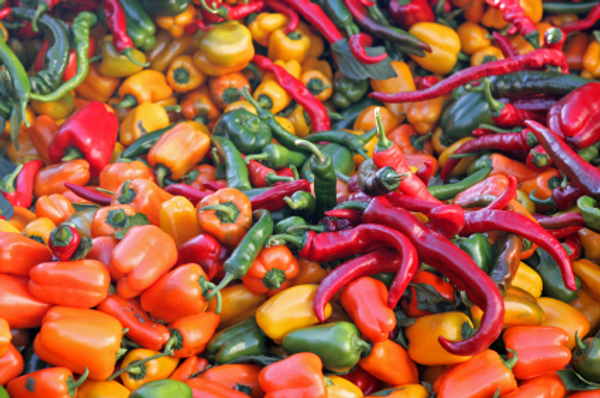Peppers
- Peppers have a lot going for them. They’re low in calories and are loaded with good nutrition. All varieties are excellent sources of vitamins A and C, potassium, folic acid, and fiber. Plus, the spicy ones liven up bland food, making it more satisfying.
- Peppers come in all sizes and colors. Some pack heat. Others are sweet. You can get them fresh, frozen, dried, or canned.
- You’ve seen bell peppers — green, orange, yellow, and red — in the grocery store or in a salad bar. Red peppers pack the most nutrition, because they’ve been on the vine longest.
Contents
Uses
Used in cuisine.
Benefits
- Green peppers are harvested earlier, before they have a chance to turn yellow, orange, and then red. Compared to green bell peppers, the red ones have almost 11 times more beta-carotene and 1.5 times more vitamin C.
Wieght Loss:
- If you’ve heard the claim that peppers make you lose weight, you may want to take it with a grain of salt.
- Capsaicin: Found in hot peppers (including chilis and cayenne powder), capsaicin has been shown to boost metabolism as well as suppress appetite, at least slightly. Over time, this effect might give you an extra edge when it comes to weight loss. But it won’t melt the pounds away.
- Research shows that people who don’t typically eat spicy foods are most likely to benefit from turning the heat up a notch. Capsaicin seems to affect metabolism by raising body temperature, which uses up more energy.
- Dihydrocapsiate (DCT): A cousin of capsaicin, DCT is found in a strain of mild, sweet chili peppers, sometimes called CH-19 peppers.
- Researchers found that DCT in capsule form acts similarly to capsaicin, minus the fiery sensation. In a small study, people who took it while following a high-protein, very low-calorie diet for a month burned about an extra 100 calories per day. However, they didn’t lose more weight than people taking a placebo pill, perhaps because their diet was already very low in calories. Larger, longer studies are needed to check the results.
- Piperine: Found in dried black pepper, piperine may prevent new fat cells from forming. The catch: Scientists have only studied it mouse cells, so there’s no proof that it will work in people. If you like Black Pepper, feel free to flavor your food with it. It’s calorie-free and won’t raise your blood pressure. Just don’t count on it to slim down.
Cautions
- When working with hot peppers, remember that they can burn your skin and eyes. Wear rubber gloves while you’re handling them, keep your hands away from your face, and wash your hands as soon as you’re done. Keep a glass of whole or low-fat milk nearby, too. Capsaicin won’t dissolve in water. You need some fat to neutralize it.
Interactions
Please consult your nutritionist.
Other names
n/a
References
Source: Brody, Barbara ; “Pepper Power: Nutrition and Other Benefits”, Reviewed by Kathleen M. Zelman, MPH, RD, LD on July 08, 2014, www.webmd.com/diet/peppers-health-benefits

